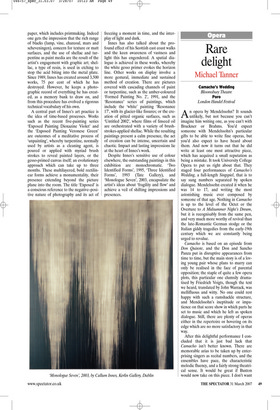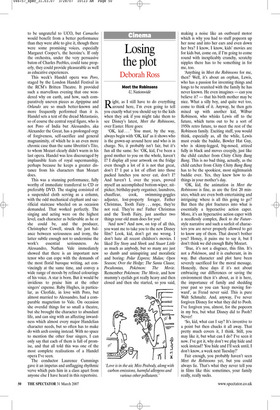Rare delight
Michael Tanner
Camacho’s Wedding Bloomsbury Theatre Poro London Handel Festival
An opera by Mendelssohn? It sounds unlikely, but not because you can’t imagine him writing one, as you can’t with Bruckner or Brahms. You’d expect someone with Mendelssohn’s particular gifts to be able to write fine operas, but you’d also expect to have heard about them. And now it turns out that he did write at least one most attractive piece, which has acquired a small reputation as being a mistake. It took University College Opera to put us right about that. They staged four performances of Camacho’s Wedding, a full-length Singspiel, that is to say sung numbers separated by spoken dialogue. Mendelssohn created it when he was 14 to 17, and writing the most astonishing music ever composed by someone of that age. Nothing in Camacho is up to the level of the Octet or the Overture to A Midsummer Night’s Dream, but it is recognisably from the same pen, and very much more worthy of revival than the late-Romantic German stodge or the Italian giddy tragedies from the early-19th century which we are constantly being urged to revalue.
Camacho is based on an episode from Don Quixote, and the Don and Sancho Panza put in disruptive appearances from time to time, but the main story is of a loving young pair whose plans to marry can only be realised in the face of parental opposition; the staple of quite a few opera plots, this particular one clumsily dramatised by Friedrich Voigts, though the text we heard, translated by John Warrack, was mellifluous and witty. No one could rest happy with such a ramshackle structure, and Mendelssohn’s ineptitude or impatience on that score show in which parts he set to music and which he left as spoken dialogue. Still, there are plenty of operas either in the repertoire or hovering on its edge which are no more satisfactory in that way.
After this delightful performance I concluded that it is just bad luck that Camacho isn’t better known. There are memorable arias to be taken up by enterprising singers as recital numbers, and the ensembles have pace, the characteristic melodic fluency, and a fairly strong theatrical sense. It would be great if Buxton would now take on this piece. I don’t want to be ungrateful to UCO, but Camacho would benefit from a better performance than they were able to give it, though there were some promising voices, especially Margaret Cooper’s, the heroine’s. If only the orchestra, under the very persuasive baton of Charles Peebles, could tune properly, they could provide pleasurable as well as educative experiences.
This week’s Handel opera was Poro, staged by the London Handel Festival in the RCM’s Britten Theatre. It provided such a marvellous evening that one wondered why on earth, and how, such comparatively uneven pieces as Agrippina and Orlando are so much better-known and more frequently performed than it is. Handel sets a text of the dread Metastasio, so of course the central royal figure, who is not Poro of India but Alessandro, aka Alexander the Great, has a prolonged orgy of forgiveness, self-sacrifice and general magnanimity, of which he is an even more chronic case than the same librettist’s Tito, to whom Mozart clearly didn’t warm in his last opera. Handel was less discouraged by implausible feats of royal supermanship, perhaps because he keeps a greater distance from his characters than Mozart does.
This was a stunning performance, fully worthy of immediate transferral to CD or preferably DVD. The staging consisted of a suspended cloth serving as a column, with the odd mechanical elephant and sacrificial staircase wheeled on as occasion demanded. That worked perfectly. The singing and acting were on the highest level, each character as believable as he or she could be, and the producer, Christopher Cowell, struck the just balance between seriousness and irony, the latter subtle enough not to undermine the work’s essential seriousness. As Alessandro, Nathan Vale immediately showed that there is an important new tenor who can cope with the demands of the most florid baroque writing, act convincingly at the same time, and convey a wide range of moods by refined colourings of his voice. A star is born. But it would be invidious to praise him at the other singers’ expense. Ruby Hughes, in particular, as Cleofide, in love with Poro, but almost married to Alessandro, had a comparable magnetism to Vale. On occasion she overdid things for so small a theatre, but she brought the character to abundant life, and can sing with an affecting inwardness which almost every major Handelian character needs, but so often has to make do with arch cooing instead. With no space to mention the other four singers, I can only say that each of them is full of promise, and that all told this was one of the most complete realisations of a Handel opera I’ve seen.
The conductor Laurence Cummings gave it an impetus and unflagging rhythmic verve which puts him in a class apart from anyone else I have heard in this repertoire.











































































 Previous page
Previous page